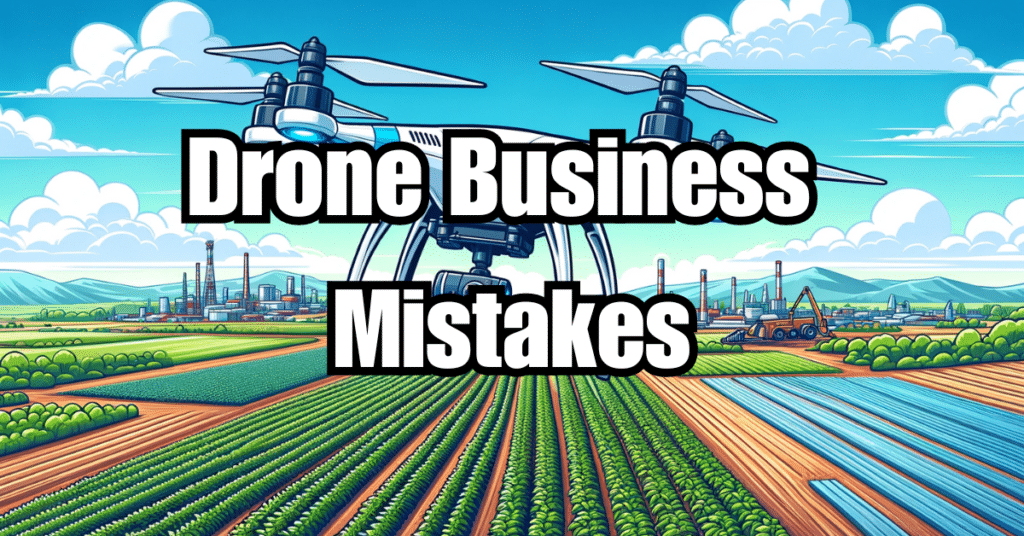Starting a drone business can be an exhilarating yet challenging journey. In this blog post, we’ll explore the top 10 most frequent mistakes made when launching a drone business, and provide insights on how to navigate these challenges effectively.
Key Takeaways
- Market Research is Crucial: Successful drone businesses start by understanding their market, identifying customer needs, and tailoring services to meet these requirements.
- The Importance of a Business Plan: A detailed business plan acts as a roadmap to success, helping to identify potential challenges and set realistic goals.
- Invest in Training and Certifications: Continuous learning and acquiring relevant certifications, like Part 107 in the US, are essential for staying competitive and compliant.
- Adequate Financial Planning: Underestimating initial capital needs can be a setback. Account for all potential expenses including equipment, licensing, and emergency funds.
- Customer Service is Key: Building long-term relationships with clients is more cost-effective than acquiring new ones and enhances business reputation.
- Specialized Equipment Knowledge: Understanding the specific capabilities of different drones and sensors is crucial for meeting diverse client needs.
- Effective Marketing and Branding: Develop a unique selling proposition and integrate it into every aspect of your business for effective client outreach.
- Legal Compliance: Staying informed about drone regulations and data privacy laws is vital to avoid legal issues.
- Insurance is Essential: Choosing the right insurance policy for your drone operations protects against risks and liabilities.
- Value-Based Pricing: Set your prices based on the perceived value to the customer, rather than just the cost, to reflect the unique benefits of your services.
Understanding Your Market
Mistake #1: Neglecting Market Research
The foundation of a successful drone business lies in thorough market research. Understanding who your customers are, their needs, desires, and the challenges they face is crucial. To provide value, you must delve deep into their world. Ask yourself:
- What problems are my potential clients facing?
- How have they been addressing these issues without my services?
- Why would they prefer my services over existing solutions?
Gather this information by interacting directly with your potential clients. This approach not only helps you tailor your offerings but also differentiates your business in a crowded market.
Crafting a Solid Business Plan
Mistake #2: Overlooking the Importance of a Business Plan
A detailed business plan is your roadmap to success. While creating a business plan might seem tedious, it’s a critical step in avoiding the pitfalls that cause many businesses to fail in their first year. Your business plan should include:
- A clear outline of your business model
- Realistic goals and benchmarks for success
- An analysis of your major expenses and funding strategies
Investing in Training and Certifications
Mistake #3: Inadequate Training and Certifications
In the drone industry, certifications like the Part 107 in the US are just the beginning. Expanding your skill set in areas like drone laws, video editing, and customer relations is equally important. Utilize free resources available online and commit to continuous learning to stay ahead in the industry.
Securing Sufficient Capital
Mistake #4: Underestimating Initial Capital Requirements
Starting a drone business can be more costly than anticipated. Ensure you account for:
- Equipment costs (drones, sensors, batteries)
- Software licensing fees
- Operational expenses (maintenance, marketing, legal services)
- Emergency funds for unforeseen expenses
Proper financial planning and budgeting are key to navigating these financial waters.
Prioritizing Customer Service
Mistake #5: Neglecting Customer Service
Building long-term relationships with clients is more cost-effective than acquiring new ones. Ensure you:
- Maintain open, honest communication
- Actively seek and incorporate customer feedback
- Be available and responsive
- Consistently exceed expectations
This approach not only retains clients but also turns them into advocates for your business.

Understanding Equipment Needs
Mistake #6: Ignoring Specialized Equipment Needs
It’s essential to understand the capabilities and limitations of your equipment. Different drones and sensors cater to specific market segments, such as precision agriculture or large-scale 3D mapping. Investing in the right equipment is crucial to meet the diverse needs of your clients.
Effective Marketing and Branding
Mistake #7: Forgetting About Marketing and Branding
Marketing is crucial for business growth. Develop a unique selling proposition (USP) and integrate it into every aspect of your business, from your logo to customer interactions. Utilize free marketing tools like social media, SEO, and email marketing to reach potential clients.
Staying Legally Compliant
Mistake #8: Overlooking Legal and Regulatory Issues
Staying informed about drone regulations and data privacy laws is vital. Regularly update yourself on:
- Flying restrictions
- Drone registrations
- Remote ID requirements
- Data privacy laws
Non-compliance can lead to legal and reputational damages.
Ensuring Adequate Insurance
Mistake #9: Inadequate Business Insurance
The risks in drone operations necessitate comprehensive insurance coverage. Research and choose a policy that:
- Covers the specific risks of your operations
- Offers adequate coverage for accidents and liabilities
Cheaper insurance options might not provide the necessary protection, so choose wisely.
Pricing Your Services Appropriately
Mistake #10: Undervaluing Your Services
Many drone operators undervalue their services, leading to lost revenue. Instead of cost-plus or competitive pricing, consider value-based pricing. This approach sets prices based on the perceived value to your customer, allowing you to charge more aligning with the unique benefits you offer.
In summary, our exploration of the top 10 mistakes to avoid when starting a drone business highlights the importance of comprehensive market research, meticulous business planning, ongoing training and certifications, adequate financial preparation, exceptional customer service, understanding the nuances of specialized equipment, effective marketing and branding, legal compliance, adequate insurance, and appropriate pricing strategies. Each of these elements plays a pivotal role in establishing and growing a successful drone business.
Take Your Drone Business to New Heights
To delve deeper into the world of drone entrepreneurship and gain further insights, we highly recommend visiting our detailed guide, “Soaring High: A Comprehensive Guide to Building and Growing Your Drone Business.” This guide is a treasure trove of information and tips that align closely with the topics we’ve discussed here. It’s an invaluable resource for anyone looking to elevate their drone business to the next level.
Need Expert Drone Services? Contact Blue Falcon Aerial
If you’re in need of professional drone services, look no further than Blue Falcon Aerial. Our team of experts is equipped to handle a wide range of drone-related tasks, ensuring top-quality results tailored to your specific needs. For inquiries or to discuss your project requirements, please don’t hesitate to contact us. Let’s make your vision a reality with the power of advanced drone technology.




